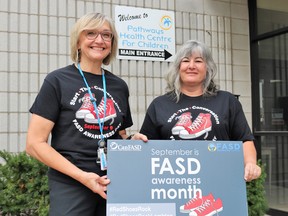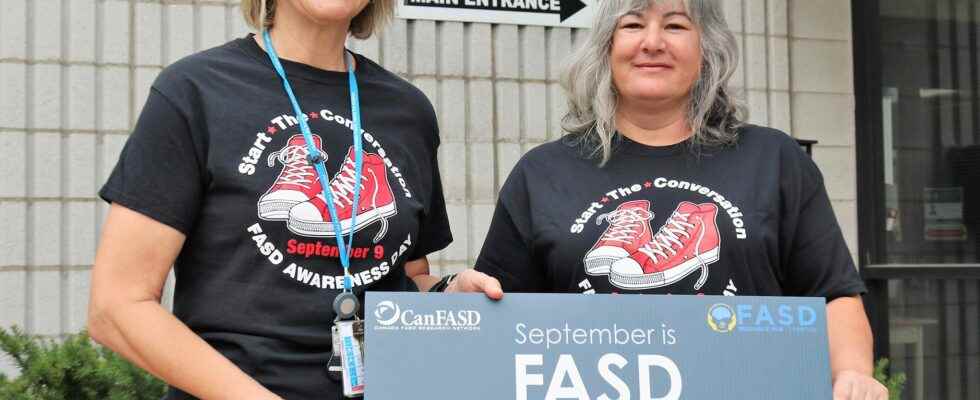
Over 1.5 million Canadians have Fetal Alcohol Syndrome Disorder (FASD), a lifelong developmental disability that affects individuals who were exposed to alcohol before birth – and recent studies suggest that the real number of people with the disorder might be significantly higher.
Known as an ‘invisible’ disability, more Canadians have FASD than autism spectrum disorder, cerebral palsy and Down syndrome combined – yet it is the most common preventable disability in North America.
And no two cases are alike – as a spectrum disorder, individuals with FASD can have a variety of symptoms depending on numerous factors, including how much alcohol they were exposed to in the womb.
Yet even though the numbers of people with FASD in Canada is staggering, very few people are truly aware of just how profoundly FASD can affect both the individual who has the disability – which can range from problems with a person’s ability to learn, their memory and their ability to communicate to slow cognitive and auditory processing, an inability to read social cues along with impulsivity and poor judgment – as well as the lives of their loved ones.
While it is entirely possible for individuals with FASD to lead successful, happy and fulfilling lives, early diagnosis and a lifetime of support are needed to give them a chance for this outcome.
September is FASD Awareness Month and Sept. 9 is International FASD Day (the ninth day of the ninth month, representing pregnancy).
As they do each year, members of the Sarnia-Lambton FASD Network – a body comprised of 15 local agencies working together to promote health, provide supports and build strengths – will be playing host to activities, putting up awareness-building signs and posters while also providing oodles of information via their Pathways FASD Resource Hub Facebook page.
FASD Family Resource worker Karen Holland hopes Lambton County residents can spare a few minutes to learn both about the real, lifelong risks associated with alcohol use during pregnancy as well as the variety of supports and services that can vastly improve the lives local people living with FASD as well as their families.
“This is one month where we have a really concentrated effort – a bigger social media presence, getting posters and lawn signs out in the community – to get people to learn more about FASD and give them resources about it,” Holland said. “The theme this year is strength and abilities. We want people to take the message that even though at least four per cent of Canadians have FASD … that these people can and will succeed if given the supports.
“It’s so complex. FASD can affect any socio-economic group, any race, any ethnicity, older women or younger women … it’s the most common preventable developmental disability. And it’s still so misunderstood, underdiagnosed and misdiagnosed,” she added.
“Numbers aren’t getting any lower, either, especially with the recent pandemic. We know that alcohol consumption increased in general during the pandemic and the way that people met up with other people changed too. The ability for certain women to get contraception also changed over the past two years– where it normally would have been easy prior to the pandemic to go to your health unit and get something, so much changed in our world, and many women were unable to do so.”
To mark FASD Awareness Month, Holland is encouraging community members to wear red shoes or don red shoelaces on Sept. 9 as part of Red Shoes Rock Day, an international FASD awareness day event kick started by a Canadian (RJ Formanek) back in 2013 to start conversations about the disability.
Then on Sept. 14, the Sarnia-Lambton FASD Network will be holding a barbecue at the Point Edward Ex-Servicemen’s Club on Michigan Ave. from 4:30 to 6 pm, featuring food, fun family activities, information about FASD, as well as some prize draws. “Our hope is to see more people face-to-face, get people curious and hopefully get more people interested throughout the community,” Holland said. Barb Plain is one Lambton County resident who knows well about both the immense challenges and the tremendous joy that comes with having a child diagnosed with FASD.
Several years ago, Plain and her husband adopted a child diagnosed with FASD and since then life has certainly not been the same, she said.
“My husband and I and our children became a fostering family years ago, and didn’t know anything at the time about FASD at all,” Plain said. “We adopted two of the children we were fostering – we were those people who thought ‘love could conquer all’, no matter what the behavior was. Then we learned that one of our children was diagnosed with FASD and a lot of those ‘love could conquer all’ strategies just don’t work with children with FASD.
“It became really, really hard – my husband and I describe it as Groundhog Day,” she added with a smile. “Neurotypical children – and I don’t want to put them all in the same box – but many of them are able to know a bit about their daily routine by Grade 1 … but when you get to Grade 4, 5 or 6 with your child with FASD and every single day it’s the same thing – chaos. You have to become their external brain.”
Traditional parenting quickly went out the window, Plain said. Strategies that had previously worked with her older children didn’t have the same effect on their child with FASD.
“I’ve had to do a 180 with my whole parenting,” she said. “The way I parented my two biological children – and they often commented – that they wouldn’t have gotten away with half of that stuff. But it’s not about that, it’s about learning how to accommodate. It’s not about giving in or letting them get away with things, but you have to accommodate their environment.
“(Traditional parenting) sounds great, but the 10th time you tell them to clean their room and they don’t … you realize it’s not going to work,” Plain continued.
“The thing is, though, that he’s a remarkable child. He’s very, very sensitive and he has a lot of empathy, but he doesn’t read facial cues for instance, so unless you’re smiling 24/7 he thinks you’re angry at him.
“It’s so hard not to traditionally consequence him or ground him like we did with our other kids, and our older kids always call us out on that, but you really do have to make accommodations.”As a result of his FASD, her child’s educational career has been extremely rocky at times, Plain said. Change is needed to better serve children with FASD in the schools, she said.
“These kids are sent home daily – and don’t get me wrong I totally understand how hard teachers have it – but they’re sent home daily,” she said. “I couldn’t work for years because our son was sent home so often due to his behaviours. But we would never send home a blind person and say ‘come back when you can see’.
“It’s more about developing a relationship with a person with FASD – that’s key. Education is secondary. If you don’t take the time to develop a relationship with them, you’re not going to get anywhere,” Plain continued. “Throughout his entire education, we had one person in my opinion that ‘got it’. People tried, and I sympathize with teachers…I know that it’s difficult and I don’t blame anyone … but kids like this are often swept under the carpet.”
There are many strategies educators can use to better engage children with FASD, Holland said.
“It takes a lot of planning and a lot of time. We appreciate how much time it takes, but a change in approach, a change in the environment is needed to help these kids along,” she said. “People need to change the lens that they’re looking at this, that will allow these kids to succeed, but it is easier for some people rather than others. And if you look at the strategies…they won’t be harmful for all the other kids in the classroom. They’ll help others as well.
“The thing is that they’re working 10 times harder, so they’re actually fatigued very quickly after a short period of time, which may come across as laziness,” Plain added. “But it’s huge for people to understand – they are trying. It might be in very short increments … but they’re doing their best.
“It’s a struggle. They have disabilities, but their heart isn’t broken. So for me, empathy and understanding and giving them opportunities, that applies both to school as well as everyday life,” Plain continued. “I love my son and I’m thrilled with him, he’s very artistic…I don’t know what our future looks like, but I know focusing on grades is a huge stressor. I have to be positive and be an advocate for him because a lot of these kids are swept under the rug.”
Though more and more people in the community are becoming familiar with FASD, there are still many in the dark about it, Plain said, and even some who refuse to acknowledge it. She sincerely hopes more community members will open their minds by getting involved in this year’s FASD Awareness Month activities.
“Things have improved a little bit, but it still floors me whenever you share it with someone you think should know it, they aren’t always open to receiving it,” she said. “It’s important to remember that children who have FASD are a person first and their disability second. They need people in their lives to take the time to know them, to understand them.”
IF YOU GO
What: FASD Awareness Month barbecue
When: Wednesday, Sept. 14 from 4:30 to 6 pm
Where: Point Edward Ex-Servicemen’s Club, 503 Michigan Avenue
What: Information on FASD, prize draws, food and family activities
